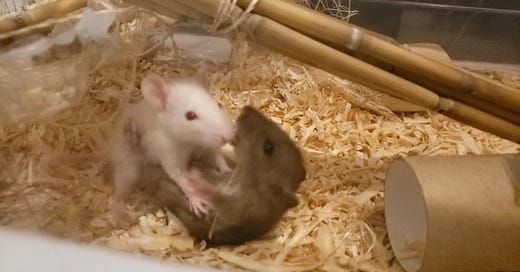We can learn a lot about ourselves by studying animals. Our huge (and new!) neocortexes make us a very unique species, of course. But still, evolution is conservative. It builds on what’s already produced.
That means that we share many ancient brain systems with other animals (especially mammals). We are much more alike other animals than we are different, especially in the deepest, most important ways.
There’s even evidence that the oldest parts of our brains “hard-wire” us with neurology that supports our basic ethical systems of fairness and reciprocity - and even gratitude.
A couple examples will illustrate.
Fair play in rats.
Scientists have discovered that rats are a lot like us in that, as juveniles, they enjoy rough-and-tumble play. Young rats will work for the opportunity to wrestle with each other. They just love it.
And much as with humans, a larger rat (10% higher body mass or more) can consistently pin his partner if he chooses. But that isn’t what usually happens. In most pairings, the bigger rat lets the smaller rat pin him about 1/3 of the time.
This “ethics of play” neural circuit is so strongly felt that if the big rat doesn’t “play fair”, the smaller one won’t play with him anymore, leading to social ostracization. Rats are very social animals, so the big rat almost always does the right thing.
Fairness in play, hard-wired deep inside the oldest parts of our brains. Pretty cool!
Reciprocity in otters.
A friend recently shared with me this video. It’s heart-warming and instructive. A frantic otter seeks help from a man because its mate is stuck in a fishing net. After the man helps and the couple is reunited, the otter quickly finds the man and gives him a prized treasure — a lovely rock perfect for cracking open shellfish, clams, and mussels.
Reciprocity. Gratitude, even. The otter hasn’t read Aristotle or Immanuel Kant, so I’m going to attribute this behavior to very deep, very old circuitry in the brain, and it’s circuitry we share.
Skeptics and curmudgeons might suspect a deceptively edited video, but this phenomenon is well known in animals.
Much of our ethical behavior isn’t motivated (at least not entirely) by our complex learned social customs and mores. In fact, I’d say it goes the other way. We build complex social ethical systems to correspond to the ethical imperatives that are already hard-wired into us.
To do otherwise would “feel wrong”. And when we successfully integrate our ethical norms and our enacted behaviors with these ancient ethical circuits, it feels really good. You know it. You’ve done it.
Murderous violence in chimpanzees.
But there’s a dark side to this insight. We also share a common ancestor with chimpanzees (our nearest neighbor on the evolutionary tree), and our two species are also the only ones known to attack and kill our own in organized onslaughts.
So, we can’t blame our proclivity for war solely on our big human neocortexes and all the violent ideologies we fill them with. Chimpanzees go to war with other chimps too, and it’s savage.
It’d be “nice” to assume that chimps only do this because of human interference, but it’s just not so. Violence is also an evolved, adaptive trait, just like fair play and reciprocity.
Therefore…?
I don’t have any big insightful conclusion for you today, folks, except to say that knowledge is generally good. Forewarned is forearmed, as they say. It’s good to understand ourselves, to understand (at least partially) why we do the things we do.
We need not be slaves to our “instincts”, either positively or negatively. But taking them into consideration as we build our higher-order social systems is probably a good idea.
We can’t pretend that we come into this world as a blank slate. Philosophies or ideologies that presume the human brain is a tabula rasa upon which any social system can be imprinted are doomed to hideous failure.
We have a specific nature. To thrive, we must acknowledge that nature, work with what is, as we aim toward what we think ought to be.
Naturally,
Adam




How lovely!!